Films with theme "Films about psychiatry", sorted by revenue
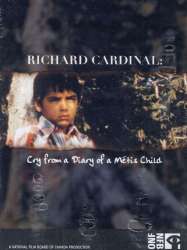
Genres Documentary
Themes Films about adoption, Films about children, Films about families, Medical-themed films, Films about suicide, Documentary films about law, Documentary films about health care, Films about psychiatry, Films about disabilities

Ocean Heaven (2010)
, 1h36Genres Drama
Themes Medical-themed films, Films about psychiatry, Films about disabilities, Films about autism
Actors Jet Li, Kwai Lun-mei, Wen Zhang, Zhu Yuanyuan, Dong Yong, Gao Yuanyuan
Ocean Heaven is about a terminally ill father, Sam Wong (Jet Li) as he works his job in an aquarium and struggles to look after his 21-year-old son Dafu, who has autism (Asperger's Syndrome) (Wen Zhang). Sam has single-handedly brought up his son since his wife died 14 years ago and looks after him day and night attempting to help him learn basic tasks in order to care for himself, as well as searching for a home for his son before he passes away. As the story progresses, the growing relationship between father and son as well as the community around them become clearer. Ling ling (Gwei Lun-mei) plays the role of a clown who is part of a small traveling circus (they perform in the aquarium for a short period of time) and who gets on well with Dafu, leading to a close friendship between them.

Pig (2011)
, 1h30Origin USA
Genres Drama, Science fiction, Thriller
Themes Films about altered memories, Medical-themed films, Films about psychiatry, Films about disabilities
Actors Rudolf Martin, Patrick Fabian, Sarah Danielle Madison, Keith Diamond, Pamela Salem, Deborah Dir
A man wakes up alone in the middle of the desert with a black hood on his head and his hands tied behind his back. At death's door, he is discovered by a woman living alone in the desert and is nursed back to health. Upon regaining consciousness, the man realizes he has no idea who he is or how he got in the desert. His only clue, a piece of paper in his pocket with the name "Manny Elder" written on it, sends him on a journey to Los Angeles to discover his past. But things and people are not what they seem and clues lead to something bigger and more unusual than the man could have ever imagined.
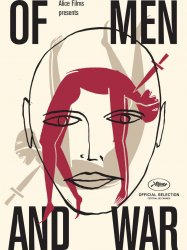
Of Men and War (2014)
, 2h22Directed by Laurent Bécue-Renard
Origin France
Genres War, Documentary
Themes Medical-themed films, Documentary films about war, Documentary films about historical events, Documentary films about health care, Films about psychiatry, Films about disabilities, Political films
Vétérans américains de la guerre d'Irak, une douzaine d'hommes restent traumatisés par la mort qu'ils ont vue, frôlée ou donnée. Dans un centre d'accueil en Californie, ils mènent une thérapie de groupe pour verbaliser les horreurs qui les hantent et se délivrer du stress post-traumatique.

Vincent Wants to Sea (2010)
Origin German
Genres Drama, Comedy-drama
Themes Medical-themed films, Psychologie, Transport films, Films about automobiles, Films about psychiatry, Films about disabilities, Road movies, Films set in psychiatric hospitals
Actors Florian David Fitz, Karoline Herfurth, Katharina Müller-Elmau, Heino Ferch, Tim Seyfi
Vincent, un jeune homme souffrant du syndrome de la Tourette qui vient de perdre sa mère, est placé dans un institut par son père, un politicien autoritaire. Là, vincent fait la connaissance de Marie, une anorexique, et d'Alexandre, animé d'un trouble obsessionnel compulsif. À trois, ils vont voler la voiture de la directrice de l'établissement, le Dr Rose, et rouler vers Trieste en Italie, où Vincent s'est promis de jeter en mer les cendres de sa mère.

The Unforgiving (2010)
, 1h15Origin South africa
Genres Thriller, Horror
Themes Medical-themed films, Psychologie, Films about psychiatry
Un psychopathe masqué a sévi dans un coin perdu d'Afrique du Sud, et les autorités interrogent les uniques survivants : Rex et Alice.

Le Mur (2011)
, 52minutesDirected by Sophie Robert
Origin France
Genres Documentary
Themes Medical-themed films, Psychologie, Documentary films about health care, Films about psychiatry, Films about disabilities, Psychanalyse, Films about autism
Le Mur est un documentaire réalisé en 2011 par Sophie Robert et produit par la société Océan Invisible Productions, en partenariat avec Autistes sans frontières, une association qui milite en faveur d’une prise en charge comportementale éducative des personnes autistes et contre la prise en charge psychanalytique.
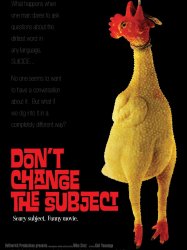
Don't Change the Subject (2012)
, 1h37Origin USA
Genres Documentary
Themes Medical-themed films, Films about suicide, Documentaire sur une personnalité, Documentary films about health care, Films about psychiatry, Films about disabilities
The movie begins with frank, humorous interviews of two men who set out to kill themselves and then moves into a Day Of The Dead celebration where the guests celebrate the lives of those whom they have lost. Director Stutz questions his family about his mother's suicide in 1979 and how little they've actually discussed it, visiting his mother's grave site with his sister and listening to old tapes of their mother. He talks to several survivors and experts before commissioning several artists to come up with works about suicide: A band (The Bigfellas) agrees to make a song about suicide "that you can dance to"; an illustrator (Patrick Horvath) is to make short animated films (which run through the documentary as interstitials); a choreographer (Danielle Peig) chooses to create a dance piece based on two autopsy reports; and a standup comedian (Duncan Trussell) compiles material for his act about suicide with the help of several top comedy writers. Meanwhile, Stutz continues to interview and engage his family about his mother's death, eventually staging his mother's suicide (where he discovered her unconscious at the age of 12) on screen with members of the "avant-garde circus" troupe, The Lucent Dossier Experience.

Directed by Éric Duvivier
Themes Medical-themed films, Psychologie, Films about psychiatry
Actors Jacques Higelin
Éric Duvivier, neveu du cinéaste Julien Duvivier, fut très tôt initié au septième art. Après la Seconde Guerre mondiale, il entrepris des études de médecine à Paris qu'il finit par abandonner. Passionné de cinéma, il créa en 1947 le Centre international du film médical qui organisa la même année le premier Congrès international du film médical au palais de la Mutualité à Paris.
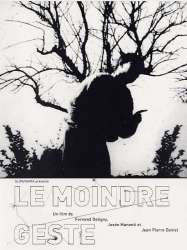
The Slightest Gesture (1971)
Genres Drama, Documentary
Themes Films about children, Medical-themed films, Psychologie, Documentary films about law, Documentary films about child abuse, Films about psychiatry, Films about disabilities, Films about autism, Films about child abuse
Yves est considéré par l’institution hospitalière comme « inéducable et irrécupérable ». Pris en charge en 1958 par Fernand Deligny, éducateur singulier dont les tentatives de cures libres refusaient l’ordinaire des méthodes psychiatriques, Yves devient en 1962 le personnage central d’un film tourné dans les Cévennes. Yves et Richard s’évadent de l’asile. En se cachant, Richard tombe dans un trou. La fille d’un ouvrier de la carrière proche observe Yves resté seul et le ramène à l’asile.
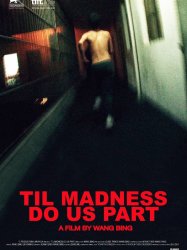
'Til Madness Do Us Part (2014)
Directed by Wang Bing (王兵)
Origin Japon
Genres Documentary
Themes Medical-themed films, Films about psychiatry, Films set in psychiatric hospitals
Le film suit pendant 3 mois les patients d'un hôpital psychiatrique du Yunnan ; spécifiquement ceux de l'étage pour hommes, mais aussi un patient en permission de sortie et de retour chez ses parents.
 , 44minutes
, 44minutesOrigin USA
Genres Documentary
Themes Medical-themed films, Films about suicide, Documentary films about war, Documentary films about historical events, Documentary films about health care, Films about psychiatry, Films about disabilities
The film focuses on the employees who staff the United States Department of Veterans Affairs suicide hotline in Canandaigua, New York. The 44-minute documentary shows the emotional strain the job has on employees (many of whom are veterans, former service members, or military family members), and the deep compassion and devotion they have for veterans in a time of crisis.

Darr (1993)
, 2h58Directed by Yash Chopra
Origin Inde
Genres Drama, Thriller, Romance
Themes Medical-themed films, Films about music and musicians, Psychologie, Musical films, Films about psychiatry, Bollywood
Actors Sunny Deol, Shahrukh Khan, Juhi Chawla, Anupam Kher, Tanvi Azmi, Dalip Tahil
Kiran (Juhi Chawla) is a college student who is on her way home for Holi break one year when she hears a man serenading her across the campus in Simla. Her heart swells as she assumes that her boyfriend, Sunil (Sunny Deol), has come to meet her and escort her home. Unfortunately, it isn't Sunil, but Rahul (Shah Rukh Khan), a classmate with a crush on her. The opening number, Jaado Teri Nazar, sets the tone for Darr, in which Rahul pursues Kiran with increasingly desperate vigor, much to the chagrin of Kiran, Sunil, her brother Vijay (Anupam Kher) and his wife Poonam (Tanvi Azmi) with whom Kiran lives.

Psycho IV: The Beginning (1990)
, 1h36Directed by Mick Garris
Origin USA
Genres Drama, Thriller, Horror, Crime
Themes Medical-themed films, Psychologie, Serial killer films, Films about psychiatry
Actors Anthony Perkins, Henry Thomas, Olivia Hussey, CCH Pounder, Janet Leigh, Warren Frost
Norman Bates is released from the mental hospital again, after having been re-incarcerated at the end of Psycho III; after spending several years there, he is judged rehabilitated for the second time. Norman is now married to a young nurse named Connie and is expecting a child. Norman secretly fears that the child will inherit his mental illness, so he must seek closure once and for all.

Shrink (2009)
, 1h44Directed by Jonas Pate
Origin USA
Genres Drama, Comedy, Comedy-drama
Themes Medical-themed films, Films about drugs, Films about psychiatry
Actors Kevin Spacey, Mark Webber, Saffron Burrows, Griffin Dunne, Jack Huston, Pell James
In Hollywood, Dr. Henry Carter (Kevin Spacey) had most of Carter's patients who are luminaries in the film industry, each undergoing their own life crisis. Carter lives in a large, luxurious house overlooking the Hollywood Hills and has published a hugely successful self-help book. However, he is disheveled and lives alone in his large house. He smokes marijuana at home, in his car and behind his office, when not seeing patients. Carter routinely drinks himself to sleep around his house, waking up in his clothes and never enters his bedroom. Despite his own problems, Carter continues psychotherapy with his patients, maintaining his incisiveness, compassion and strong doctor-patient relationships.
 Connection
Connection